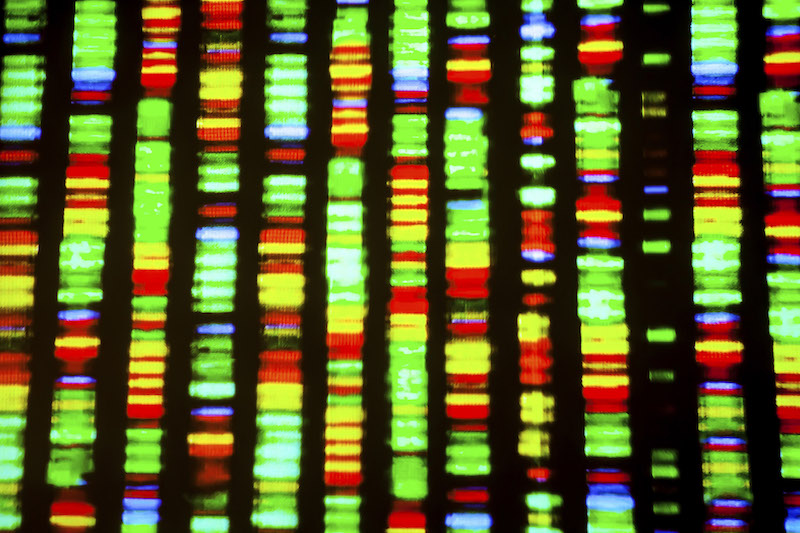One of Cambridge Enterprise’s most exciting new portfolio companies is Cambridge Epigenetix, a pioneer in the development of epigenetic sequencing. Founded in 2012 by Prof Shankar Balasubramanian of the Department of Chemistry, the company is focused on developing best-in-class tools to make studying DNA methylation and DNA hydroxymethylation as easy as studying DNA sequencing.
Cambridge Epigenetix’s starting point is with their patented TrueMethyl oxidative bisulfite sequencing, a novel technology that pioneers quantitative, single-based resolution sequencing of the modified bases hydroxymethyl cytosine and methylcytosine. TrueMethyl enables analysis of the DNA methylome with unprecedented accuracy and opens new avenues for basic research, pharmaceutical discovery and diagnostics.
Co-invented by Balasubramanian and Dr Michael Booth, a former PhD student of Prof Balasubramanian who now holds a postdoc at Oxford, Cambridge Epigenetix’s innovative technology uses a selective chemical oxidation that accurately distinguishes between methylcytosine and hydroxymethyl cytosine.
Balasubramanian believes “reprogramming the way DNA functions is fundamental to all living systems”. His DNA sequencing technology is helping researchers understand modifications to DNA, by detecting ‘extra’ DNA bases, which until 2013 could not be definitively identified.
Over the last four years Cambridge Epigenetix has grown quickly and organically. Earlier this year, Cambridge Epigenetix announced a $21 million Series B financing and the appointment of Dr Geoff Smith as CEO. The round was led by GV (formerly Google Ventures) with participation from Sequoia Capital, New Science Ventures and Syncona. In conjunction with the fundraising, Tom Hulme, GV general partner, joined Cambridge Epigenetix’s board of directors.
CEO Dr Geoff Smith joined Cambridge Epigenetix from Illumina Inc (the company that acquired Balasubramanian’s first Cambridge venture), where he was VP of Product Development. Smith explains “Cambridge Epigenetix is today ideally positioned to catalyse the market for epigenetics—just as Solexa and Illumnia did for genomics a decade ago—and I am thrilled to have joined at such a transformational time, both in terms of the company and in driving the next generation of epigenetic products”.
Prof Balasubramanian co-founded his first ‘blue ocean’ genetics business, Solexa Limited, in 1998 to develop Sequencing-by-Synthesis, which is now the basis for Illumina’s market-leading NGS technology. He co-founded Cambridge Epigenetix on similarly cutting-edge, patented technology that is now in use in labs around the world and continues to form the technological backbone for breakthrough work in epigenetics.
Simply put, a blue ocean is a previously unknown market space. A blue ocean business is one that creates a completely new industry through fundamental differentiation, as opposed to businesses that compete in existing industries by tweaking established models. Rather than outdoing competitors in terms of traditional performance metrics, a blue ocean business creates new, uncontested market space through value innovation. This can be done by launching a completely new industry, like ebay did with online auctions, or when a company expands the boundaries of an existing industry, as CNN did with 24 hour news. Both of the companies that Cambridge Enterprise has had the privilege of working on with Balasubramanian have created vast blue oceans in the genetics industry.
Solexa Limited became one of the University’s greatest commercialisation success stories. It dates back almost 10 years before the anniversary that Cambridge Enterprise is now celebrating. Its journey from launching in 1998 for rapid, whole genome sequencing and Solexa’s eventual acquisition by US-based Illumina Inc in November 2006 for $650 million is a key success story for us, not least because of the enormous success of Solexa (and its truly global impact) that led to the creation of Cambridge Enterprise.
Now Prof Balasubramanian and his team at Cambridge Epigenetix are building upon Solexa’s outstanding record of success in the genetics industry. According to GV’s Tom Hulme, Cambridge Epigenetix has an incredible future. “We’ve seen how the commercialisation of genome sequencing has created incredible opportunities to improve human health, and now the epigenome holds similar potential. Cambridge Epigenetix is one of the few teams on the planet with the skills and experience to break new ground here.”
The full story of Solexa Limited can be read here.
Tags: MIGRATED











